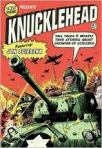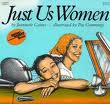Posts tagged ‘family’
149. Knucklehead by Jon Scieszka
 Retell: The subtitle says it all: “Tall Tales & Mostly True Stories About Growing Up Scieszka.”
Retell: The subtitle says it all: “Tall Tales & Mostly True Stories About Growing Up Scieszka.”
Topics: boys, brothers, growing up, catholic school, rough-housing, adventure, reading, family
Units of Study: Memoir, Personal Narrative, Nonfiction
Tribes: Mutual Respect, Appreciations/No Put-Downs
Habits of Mind: Finding Humor
Reading Skills: Understanding figurative language and humor
Writing Skills: Balancing dialogue with description and inner thinking, including prologues
Thoughts: This is a must-read for any teacher who plans on doing a Personal Narrative or Memoir unit. Most stories are short (1-3 pages), hilarious and at times disgusting. I personally love the story entitled, “Car Trip,” a story about brothers in the back of a car reacting to a cat puking. Many of the stories end with a reflection making them ideal mentor texts if you’re teaching Memoir. One story, “Random Reading” may be useful during a Nonfiction unit. In this story he talks about enjoying the diagrams found within the pages of the Golden Book Encyclopedia series. Jon Scieszka writes particularly with boy readers and writers in mind. If you haven’t already, check out his website called Guys Read.
146. When I Was Young In the Mountains by Cynthia Rylant
 Retell: Rylant beautifully recalls her childhood where she swam in swimming holes and sat on porch swings.
Retell: Rylant beautifully recalls her childhood where she swam in swimming holes and sat on porch swings.
Topics: grandparents, family, rural communities, childhood, country
Units of Study: Memoir, Personal Narrative
Reading Skills: inference, interpretation
Writing Skills: writing commas in lists, including poignant details
My Thoughts: This is a read aloud classic that I have rediscovered. My class has just started collecting ideas for their memoirs. I read this book out loud the other day. Though half the class had read it previously, there were no groans when I showed the cover and read the title. During a “turn-and-talk” I over heard one student convincing her partner that the author was trying to show how special rural life can be. She said, “In the city, you are never allowed to go outside by yourself. But in this book the girl was allowed to go to the swimming hole all by herself. I think this book might be about freedom.” I had never actually read this book in that way before. I love it when my students make me see a book in a new light.
Read this book when you need the room to go to a peaceful, sentimental silence.
141. Coming On Home Soon by Jacqueline Woodson
 Retell: Ada Ruth can’t wait for her mom to return home from Chicago. The story takes place during World War II. Ada Ruth’s mother has gone North to seek jobs on the railroad. With help from her grandmother and her new feline friend, Ada Ruth is able to wait patiently for her mom to come on home.
Retell: Ada Ruth can’t wait for her mom to return home from Chicago. The story takes place during World War II. Ada Ruth’s mother has gone North to seek jobs on the railroad. With help from her grandmother and her new feline friend, Ada Ruth is able to wait patiently for her mom to come on home.
Topics: goodbyes, World War II, Chicago, family, pets, cats, poverty, hunger
Units of Study: Historical Fiction, Talking and Writing About Texts, Social Issues
Tribes: personal best
Reading Skills: inference, prediction, interpretation
Writing Skills: tucking in details about setting, zooming in on small moments
My Thoughts: This is a great text to read aloud during an Historical Fiction unit. It’s a useful text for modeling how readers think about symbolism (or alternatively how writers incorporate symbolism). For example, it would be helpful to point out the meaning of the kitten in the story. One could read the story without giving much thought about the kitten’s importance. However, upon closer reading, one could read into the kitten’s significance. Perhaps the kitten is a symbol that represents Ada Ruth’s hope that her mother will write soon. Perhaps the kitten symbolizes her loneliness.
140. When the Shadbush Blooms by Carla Messinger with Susan Katz
 Retell: A Lenape Indian girl describes how her family has worked, played and celebrated throughout the seasons and throughout the generations.
Retell: A Lenape Indian girl describes how her family has worked, played and celebrated throughout the seasons and throughout the generations.
Topics: Lenni Lenape, generations, past, present, cycles, family, seasons, farming, nature
Units of Study: Nonfiction, Content Area, Memoir
Tribes: mutual respect
Reading Skills: monitoring for sense, interpretation, synthesis
My Thoughts: This is a great text to support a Social Studies unit on the Lenni Lenape. In this book, the illustrations really tell the story and support interpretation work. The narration is illustrated on the right hand pages: A modern Lenape family farms, weatherizes their house to prepare for winter, fishes for shad, and plays games in the snow. On the left hand pages, a Lenape family from the past do the same activities.
138. Jose! Born to Dance by Susanna Reich
 Retell: This is the story of Jose Limon, who left his family to move to New York. Frustrated by his poor artistic talent he fell in love with dance and worked to become a famous dancer and choreographer.
Retell: This is the story of Jose Limon, who left his family to move to New York. Frustrated by his poor artistic talent he fell in love with dance and worked to become a famous dancer and choreographer.
Topics: dance, war, family, Mexico, immigration, art, music, English, Spanish, death, New York, California
Units of Study: Nonfiction, Social Issues
Tribes: personal best, appreciations/no put-downs, mutual respect
Habits of Mind: persisting
Reading Skills: synthesis, monitoring for sense, envisionment
Writing Skills: using sound effects, zooming in on a small moment
My Thoughts: This text has multiple teaching purposes. It’s a great text for introducing or reinforcing the habit of mind–persistence. There are many moments in the story when Jose persists. He struggles to learn English but persists despite his cruel classmates. He is determined to become a dancer and shows persistence each day during rehearsal despite sore, aching muscles. During the read aloud we can hope that students understand that successful people, no matter what their focus, work hard and persist, even when they face adversity.
137. When Lightning Comes in a Jar by Patricia Polacco
 Retell: Patricia Polacco describes a fun-filled family reunion where the adults challenge the kids to baseball games, the aunties make meatloaf and jello salads, and everyone catches fireflies.
Retell: Patricia Polacco describes a fun-filled family reunion where the adults challenge the kids to baseball games, the aunties make meatloaf and jello salads, and everyone catches fireflies.
Topics: reunions, family, baseball, curiosity, storytelling, fireflies, tradition, parties
Units of Study: Memoir, Personal Narrative
Reading Skills: envisionment, interpretation
Writing Skills: incorporating sensory details, storytelling
My Thoughts: When planning read alouds, I have been trying to create text sets, planning books not just by unit of study, but by themes. I’m thinking of creating a text set with the theme of ‘traditions’ which may include When Lightning Comes in a Jar, The Keeping Quilt, and When the Relatives Came. This book could also be great to read when you are teaching students to storytell to their partners. Storytelling is a Polacco family reunion tradition.
136. Harvesting Hope: The Story of Cesar Chavez
 Retell: This is the biography of Cesar Chavez, the leader of the National Farm Workers Association who worked to organize farm workers to rally together and fight for better pay and working conditions.
Retell: This is the biography of Cesar Chavez, the leader of the National Farm Workers Association who worked to organize farm workers to rally together and fight for better pay and working conditions.
Topics: family, Cesar Chavez, conflict, drought, California, farming, Spanish, migrant workers, unions, La Causa, strikes, protests, boycotts, farm workers
Units of Study: Nonfiction, Social Issues
Tribes: personal best, mutual respect, appreciations/no put-downs
Habits of Mind: persisting
Reading Skills: inference, interpretation, determining importance, synthesis, empathy
My Thoughts: Back when I taught in California this was required reading–in the Bay Area Cesar Chavez’s birthday is a school holiday. This book could fit into different types of text sets. For example, you could include this book when teaching a unit on the labor unit. You could also choose to read this book as a companion text to Esperanza Rising.
135. Presidential Pets by Laura Driscoll
 Retell: A history of presidents and their beloved pets.
Retell: A history of presidents and their beloved pets.
Topics: pets, presidents, fun, friendship, dogs, Obama, Bo, family
Units of Study: Nonfiction, Content Area
Reading Skills: synthesis, making connections, interpretation
Writing Skills: developing voice in nonfiction
My Thoughts: I picked this book up a few days ago at our school’s book fair. I have a lot of animal lovers in my class who only read nonfiction about animals. This book combines an interest in animals with an interest in presidential history and current events. It’s a nice book for demonstrating how readers can often get distracted by seductive details but must work constantly to think about what the author is trying to say about the topic.

